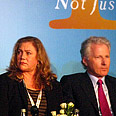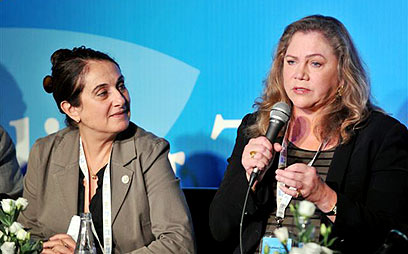
Peres Center uses creative conduit to summon peace
Center for peace presents 'Zoora', a program aimed at creating cooperation between Israeli, Palestinian filmmakers in order to counter negative public opinion inspired by superficial media coverage
Aliza Savir, deputy director-general of the Peres Center and the leader of the program, hopes "Zoora" (which means 'shape' in Hebrew and 'picture' in Arabic) will provide a platform for the creative communities on both sides to work together, exchange information, and overcome cultural gaps.
The program is founded on the belief that one of the main obstacles for peace between Israelis and Palestinians is hate-based public opinion on both sides. In order to change that, each of the sides must tell its story and expose itself to the public, Savir explained before a panel of council members elected to provide creators participating in 'Zoora' with training, funding, and overall assistance through the program's website.
The panel opened with a discussion led by journalists on the issue of the media and its depiction of the "other." Palestinian journalist Doud Kutab said he believes the media has the power to break through stereotypes. "The Palestinian has no face or name in the media, he is mainly a statistical figure, and this is true for the Israeli and Arab media, there is no 'normal' Palestinian," he said.
"In al-Jazeera and al-Arabiya, the Palestinian is a 'hero' and in the Israeli channels he is a 'terrorist'. I would like the media to see us as real people for better or worse, beautiful or ugly," Kutab added.
According to actress Kathleen Turner, the way to bridge gaps is by using the technological resources of the current age, such as the internet, which she lauded as a helpful tool for making movies cheaply and more quickly, and reaching more people worldwide.

Kathleen Turner and Aliza Savir at panel (Photo: Yossi Zeliger)
American journalist Judith Miller said the internet could also sidestep the tough censorship placed on the media by outside sources. But in order to create mass communication you need masses, she said.
Miller added that she would like to see an Israeli-Palestinian version of NBC's "Will and Grace", explaining the significant part television characters play in swaying public opinion.

American journalist Judith Miller (Photo: Merav Yudilovitch)
Savir said "Zoora" would attempt to reach the masses via internet once it had achieved its fund-raising goal of $2.5 million. The website in the making will provide communities of film and television creators from both sides with a place in which to meet and exchange ideas, receive guidance from professionals and even edit their work. The site will also include lectures, texts, and audio and video projects.
Participants from the Palestinian side include producers and media agency owners such as Mahmoud Matar, who said, "The image we get from the TV of the other side is what is reflected in the news. This is, of course, a picture that doesn't represent the reality of life in both societies. That's why we need 'Zoora', to show the human faces of both sides."
Matar explained that the program would begin by training a number of creators, and then move on to the production of short films and documentaries that would air on Israeli and Palestinian television channels.
Kamel Husseini, known for his participation in the Geneva Initiative, said the program could revive a dialogue that has waned over 17 years of political quarreling.
"The path to connecting people passes through the cultural and artistic community, which will succeed where politicians have failed," he said.










